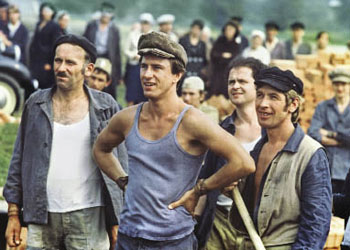Kino Mania: May 2011
The Mill and the Cross (2011)
Starring: Rutger Hauer, Peter York, Charlotte Rampling,
Director: Lech Majewski
Based on the book by historian Michael Gibson, this latest feature from Polish writer, painter and director Lech Majewski is an attempt to enact episodes from Pieter Bruegel the Elder’s 1564 painting The Procession to Calvary. Set almost entirely in Małopolska, Majewski’s film is an elaborate coalescence of live action footage and blue screen work in which the Christ episode is just one of a series of visual anecdotes. The visual references are not limited to Bruegel’s imagery. The elaborate folds of Saint John and the Virgin Mary’s costumes recall the Flemish Primitive style. The indoor scenes featuring Bruegel’s children wildly playing, like in a Jean Vigo movie, evoke the light of Dutch interior paintings from 17th century. The spider’s web carefully examined by Bruegel (played by a restrained Rutger Hauer) is both a symbol of the fragmentary perception of the world in medieval times and a symbol of God’s creation, which is also represented by the character of the miller observing humanity from a rocky pinnacle. It is Bruegel who gives the miller the signal to stop time and freeze mankind. God and the artist are, therefore, placed on the same level. The slow shots are reminiscent of Michael Snow’s experimental video work and Dorota Roqueplo’s lavish costumes will charm anyone who has been entranced by the obsessional quality of Renaissance depictions of cloth and clothing.
Erratum (2010)
Starring: Tomasz Kot, Ryszard Kotys
Director: Marek Lechki
Apparently happy and successful family man Michał is forced to spend an extended weekend in the hometown he thinks he has left behind. The bloodstains on his shirt after he runs down and kills a drunken homeless man with his boss’ car push him to investigate the dead man’s life, but he ends up discovering more about his own past than about the victim’s. Michał broods over past decisions en plein air – the film’s title ‘Erratum’ means both ‘error’ and ‘to wander’ in Latin. Marek Lechki explores the relationship between Michał and his father to portray the solitude of the aged homeless in Lower Silesia. Erratum is a sober and convincing feature film debut.
Man of Marble (1977)
Starring: Krystyna Janda, Jerzy Radziwiłowicz, Tadeusz Łomnicki
Director: Andrzej Wajda
Wajda’s story follows film student Agnieszka as she researches the life of Mateusez Birkut for her diploma project. Birkut is the fictional equivalent of the workers who were lauded in the Stalinist era for their quota-busting efforts in the factories, fields and building sites of the Soviet Bloc – the heroes of the Stakhanovite movement. Agnieszka remembers him as an over-achieving bricklayer involved in the construction of Nowa Huta whose dedication was propagandised with marble statues in the 1950s, but wonders what became of him. Krystyna Janda portrays the dauntless heroine in a big screen debut full of empathy that reveals her theatrical education. Her character was probably inspired by then-young film director Agnieszka Holland and is a tribute to the ethics and style of a new generation of Polish directors that included names such as Kieślowski, Zanussi and Holland herself. On another level Man of Marble deals with the optimism of the pre-Gomułka era with its blind faith in social competition and, more generally, Stalinism. In the early 1950s the destabilizing impact of Stachanovism on social cohesion and the envy and tension it created among workers were ignored. Birkut is finally disenchanted, as is Agnieszka. She tracks the discarded hero to the Gdańsk shipyards, only to discover that he has died two years earlier. Wajda the clairvoyant smells a turning point in Poland’s history. He connects the fate of the Stalinist-era workers of Nowa Huta with the struggles of their sons and daughters in the shipyards 20 years later. It is startling that such an overtly political film got past the censors of the time, at least until you hear that the script had been in development limbo since 1962.

